For two years, Cab Drivers United/AFSCME Local 2500 has fought to reform the harsh and arbitrary rules the City of Chicago imposes on professional cab drivers – providing drivers with the tools and education to defend themselves in the city taxi court system at 400 West Superior.
Yesterday, Monday, September 12th, new Public Chauffeur reforms go into effect.
Cab Drivers United/AFSCME Local 2500 has been advocating for these reforms for some time, working with city decision-makers, and elected officials in addition to Cab Drivers United/AFSCME Local 2500 members’ work on the Taxi Fairness Taskforce which led the way to the reforms we see being implemented this week.
These new rules will make it harder for police officers to issue multiple or unfair citations by eliminating violations like “proper attire”, “loitering”, “littering” that are often used by police to pile on tickets unfairly.
Furthermore, the city can no longer threaten maximum fines or license suspensions for minor charges like overcrowding a cabstand or using a cell phone when a driver doesn’t have a passenger, taking away a lot of the weapons city attorneys use to bully drivers into settlement.
“These rule changes, while important to our hardworking cab drivers like myself, do nothing to address the biggest injustice facing taxi drivers – the unfair competition created by the city’s regulatory double standard between taxi drivers and rideshare drivers” said Cab Drivers United/AFSCME Local 2500 member Ezz Abdelmagid.
“When the city opened up the floodgates to services like Uber and Lyft, without instituting requirements to drive for those services comparable to those imposed on cab drivers, as a lease driver, it’s become nearly impossible for me to make ends meet” continued Abdelmagid.
Because of the city’s inaction, taxi service as we know it is in serious decline. In 2013, per the City of Chicago’s own reporting, there were 6 taxi medallions surrendered or foreclosed on – while in 2016 through June, that number was 621.
Uber’s own numbers indicate the presence of 100,000 for-hire vehicles in Chicago, none of whom face comparable licensing requirements or regulations imposed on cab drivers – creating a separate and unequal regulatory system that punishes cab drivers who have made a modest living following the rules.
